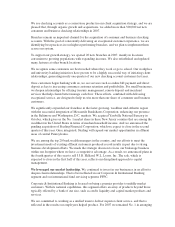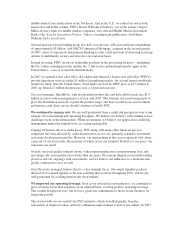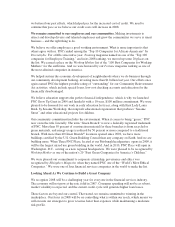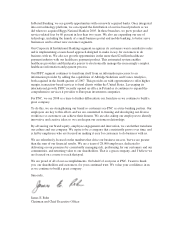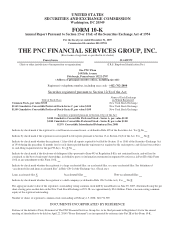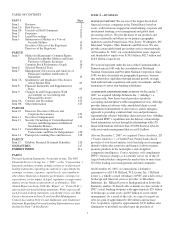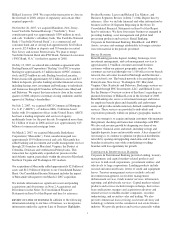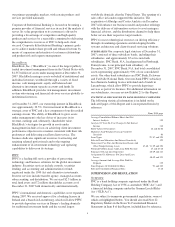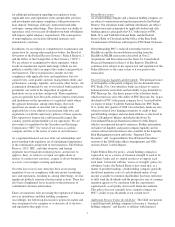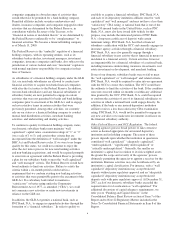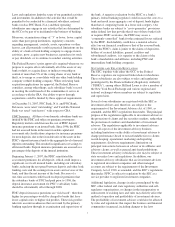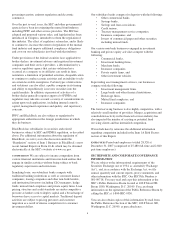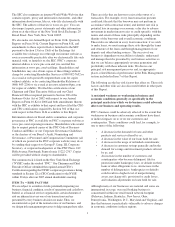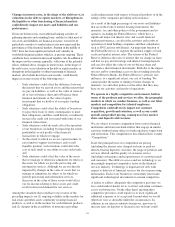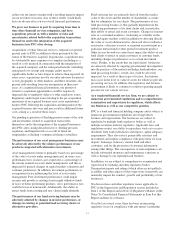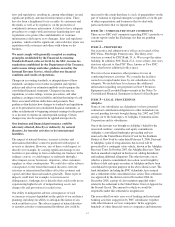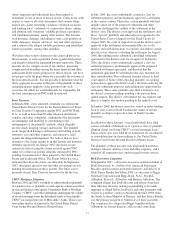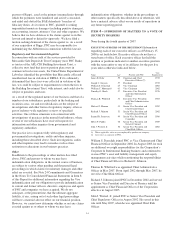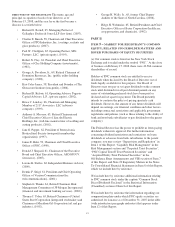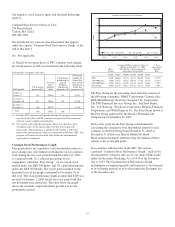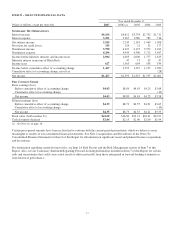PNC Bank 2007 Annual Report Download - page 12
Download and view the complete annual report
Please find page 12 of the 2007 PNC Bank annual report below. You can navigate through the pages in the report by either clicking on the pages listed below, or by using the keyword search tool below to find specific information within the annual report.
Laws and regulations limit the scope of our permitted activities
and investments. In addition to the activities that would be
permitted to be conducted by a financial subsidiary, national
banks (such as PNC Bank, N.A.) and their operating
subsidiaries may engage in any activities that are determined by
the OCC to be part of or incidental to the business of banking.
Moreover, examination ratings of “3” or lower, lower capital
ratios than peer group institutions, regulatory concerns
regarding management, controls, assets, operations or other
factors, can all potentially result in practical limitations on the
ability of a bank or bank holding company to engage in new
activities, grow, acquire new businesses, repurchase its stock
or pay dividends, or to continue to conduct existing activities.
The Federal Reserve’s prior approval is required whenever we
propose to acquire all or substantially all of the assets of any
bank or thrift, to acquire direct or indirect ownership or
control of more than 5% of the voting shares of any bank or
thrift, or to merge or consolidate with any other bank holding
company or thrift holding company. When reviewing bank
acquisition applications for approval, the Federal Reserve
considers, among other things, each subsidiary bank’s record
in meeting the credit needs of the communities it serves in
accordance with the CRA. Our ability to grow through
acquisitions could be limited by these approval requirements.
At December 31, 2007, PNC Bank, N.A. and PNC Bank,
Delaware, were rated “outstanding” and Yardville National
Bank was rated “satisfactory” with respect to CRA.
FDIC Insurance. All three of our domestic subsidiary banks are
insured by the FDIC and subject to premium assessments.
Regulatory matters could increase the cost of FDIC deposit
insurance premiums to an insured bank. Since 1996, the FDIC
had not assessed banks in the most favorable capital and
assessment risk classification categories for insurance premiums
for most deposits, due to the favorable ratio of the assets in the
FDIC’s deposit insurance funds to the aggregate level of insured
deposits outstanding. This resulted in significant cost savings to
all insured banks. Deposit insurance premiums are assessed as a
percentage of the deposits of the insured institution.
Beginning January 1, 2007, the FDIC reinstituted the
assessment premiums for all deposits, which could impose a
significant cost to all insured banks, including our subsidiary
banks, reducing the net spread between deposit and other bank
funding costs and the earnings from assets and services of the
bank, and thus the net income of the bank. Because of a
one-time assessment credit based on deposit premiums that
the subsidiary banks of PNC had paid prior to 1996, the
deposit insurance assessment for PNC’s subsidiary banks
should be substantially offset through 2008.
FDIC deposit insurance premiums are “risk based”; therefore,
higher fee percentages would be charged to banks that have
lower capital ratios or higher risk profiles. These risk profiles
take into account weaknesses that are found by the primary
banking regulator through its examination and supervision of
the bank. A negative evaluation by the FDIC or a bank’s
primary federal banking regulator could increase the costs to a
bank and result in an aggregate cost of deposit funds higher
than that of competing banks in a lower risk category. Our
subsidiary banks are subject to “cross-guarantee” provisions
under federal law that provide that if one of these banks fails
or requires FDIC assistance, the FDIC may assess a
“commonly-controlled” bank for the estimated losses suffered
by the FDIC. Such liability could have a material adverse
effect on our financial condition or that of the assessed bank.
While the FDIC's claim is junior to the claims of depositors,
holders of secured liabilities, general creditors and
subordinated creditors, it is superior to the claims of the
bank’s shareholders and affiliates, including PNC and
intermediate bank holding companies.
S
ECURITIES AND
R
ELATED
R
EGULATION
The SEC, together with either the OCC or the Federal
Reserve, regulates our registered broker-dealer subsidiaries.
These subsidiaries are also subject to rules and regulations
promulgated by the Financial Industry Regulatory Authority
(“FINRA”), among others. Hilliard Lyons is also a member of
the New York Stock Exchange and various regional and
national exchanges whose members are subject to regulation
and supervision.
Several of our subsidiaries are registered with the SEC as
investment advisers and, therefore, are subject to the
requirements of the Investment Advisers Act of 1940, as
amended, and the SEC's regulations thereunder. The principal
purpose of the regulations applicable to investment advisers is
the protection of clients and the securities markets, rather than
the protection of creditors and shareholders of investment
advisors. The regulations applicable to investment advisers
cover all aspects of the investment advisory business,
including limitations on the ability of investment advisers to
charge performance-based or non-refundable fees to clients;
record-keeping; operational, marketing and reporting
requirements; disclosure requirements; limitations on
principal transactions between an adviser or its affiliates and
advisory clients; as well as general anti-fraud prohibitions.
These investment advisory subsidiaries also may be subject to
state securities laws and regulations. In addition, our
investment advisory subsidiaries that are investment advisors
to registered investment companies and other managed
accounts are subject to the requirements of the Investment
Company Act of 1940, as amended, and the SEC’s regulations
thereunder. PFPC is subject to regulation by the SEC as a
service provider to registered investment companies.
Additional legislation, changes in rules promulgated by the
SEC, other federal and state regulatory authorities and self-
regulatory organizations, or changes in the interpretation or
enforcement of existing laws and rules may directly affect the
method of operation and profitability of investment advisers.
The profitability of investment advisers could also be affected
by rules and regulations that impact the business and financial
communities in general, including changes to the laws
7


